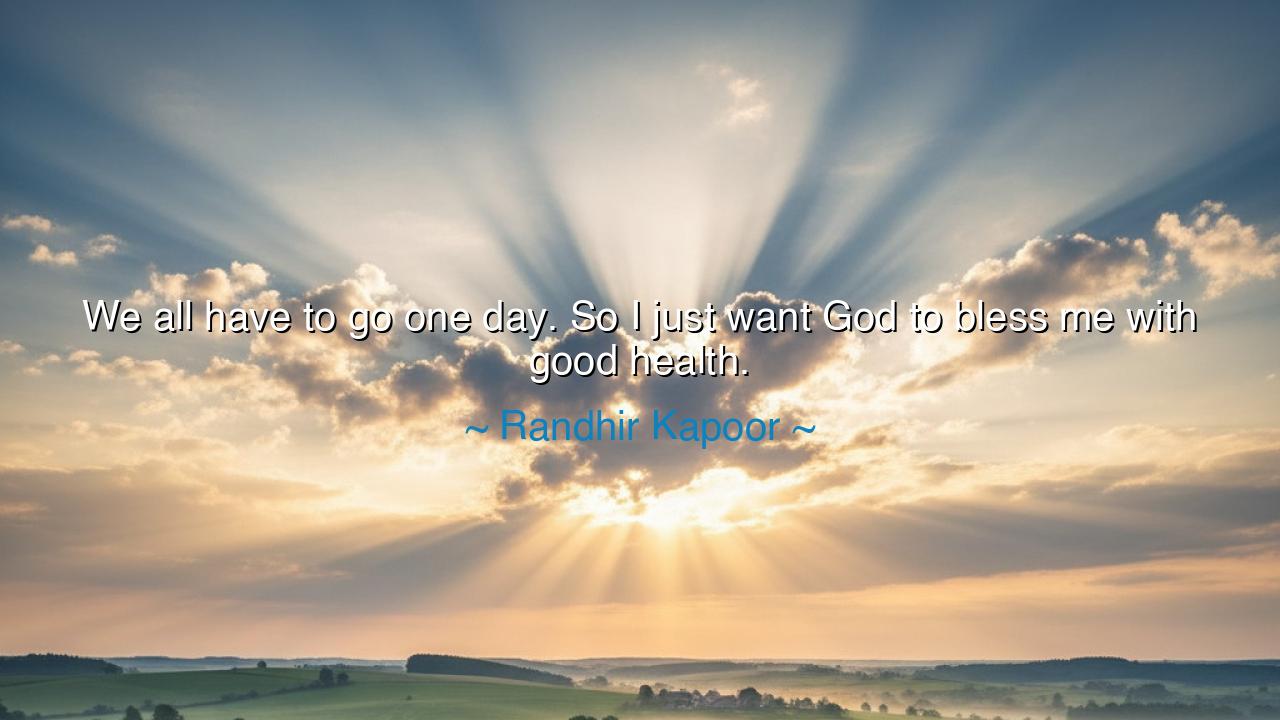
We all have to go one day. So I just want God to bless me with






“We all have to go one day. So I just want God to bless me with good health.” — thus spoke Randhir Kapoor, heir to a golden lineage of artists, yet a man grounded in the humble wisdom of mortality. His words are not adorned with philosophy, yet they shine with the deep light of truth, born from the awareness that life is fleeting, and that all human striving must eventually bow before the law of time. In this simple declaration, Kapoor captures what sages and kings alike have discovered: that though death is inevitable, health — the vitality of body and spirit — is the greatest blessing that can accompany us upon the journey toward it.
The quote’s meaning unfolds like a calm river, profound in its stillness. When he says, “We all have to go one day,” Kapoor acknowledges the eternal truth that every life, however glorious, must end. No crown, no art, no fortune, no fame can halt the hand of destiny. Yet within that recognition lies not despair, but peace — for to accept mortality is to be freed from the tyranny of fear. What he asks of God is not immortality, but good health, the strength to live each day with dignity and joy until that final sunset arrives. In his words, we hear the echo of the ancient philosophers who taught that wisdom begins with the acceptance of death, and that the true art of living is to walk toward the end without regret.
This truth was known to the ancients of every land. Marcus Aurelius, the philosopher-king of Rome, wrote in his Meditations that man should “live each day as if it were his last, without frenzy, without apathy, without pretense.” Likewise, the sages of India spoke of Ayurveda, not as a science of eternal youth, but as the harmony of mind, body, and spirit that allows one to live well, no matter how long life may be. Randhir Kapoor’s plea for “good health” is, in essence, a prayer for this harmony — for the inner balance that makes life worth living even in the face of impermanence.
History offers countless examples of those who learned this lesson only when it was nearly too late. Consider the tale of Emperor Ashoka, who once ruled a vast and mighty empire. After his conquest of Kalinga, he stood upon the battlefield, surrounded by victory — yet the cries of the wounded and dying filled him with horror. In that moment, he understood that power and wealth could not preserve peace within the heart. He turned from war to compassion, from conquest to wisdom. Though his strength remained, his spirit sought a deeper kind of health — the health of the soul. Ashoka’s transformation reminds us that true well-being is not the absence of illness, but the presence of peace.
When Kapoor asks for blessing, he invokes something sacred — the idea that health is not merely physical, but divine. For there is a health of the flesh, and there is a health of the spirit, and both are sustained by grace. A strong body without a tranquil heart is like a well-built ship without a compass. To be blessed with good health, therefore, is not only to live without disease, but to live in gratitude, in balance, and in kindness toward oneself and others. Health, in this view, becomes a form of prayer — a daily act of reverence toward the gift of existence.
And yet, beneath Kapoor’s serenity lies a subtle reminder of humility. “We all have to go one day,” he says — as though to caution us against pride in our accomplishments or possessions. Life’s treasures are fleeting: fame fades, beauty wanes, and even memory turns to dust. Only the quality of our days — the laughter shared, the love given, the peace within — endures beyond the years. In recognizing this, he joins a lineage of poets and mystics who saw mortality not as a curse, but as a guide toward meaningful living.
The lesson, then, is this: do not seek to escape death, for it is the law of life. Instead, seek to live so well that when death arrives, it finds you whole — not broken by bitterness or fear. Cherish your health as sacred ground, tending it with care, rest, and gratitude. Eat wisely, move gently, and think kindly. Keep your heart light, for heaviness shortens life more surely than age. And when you pray, do not ask for endless years, but for strength and serenity within them.
So, my children of this modern age, remember the wisdom of Randhir Kapoor. The day will come when the body grows still, as it must for all. But until that day, live with health — in body, in mind, and in spirit. Give thanks for every sunrise, and walk each step as though it were your last and best. For in the end, the greatest blessing is not a life without death, but a life fully lived, gratefully breathed, and peacefully surrendered to the rhythm of the eternal.






AAdministratorAdministrator
Welcome, honored guests. Please leave a comment, we will respond soon